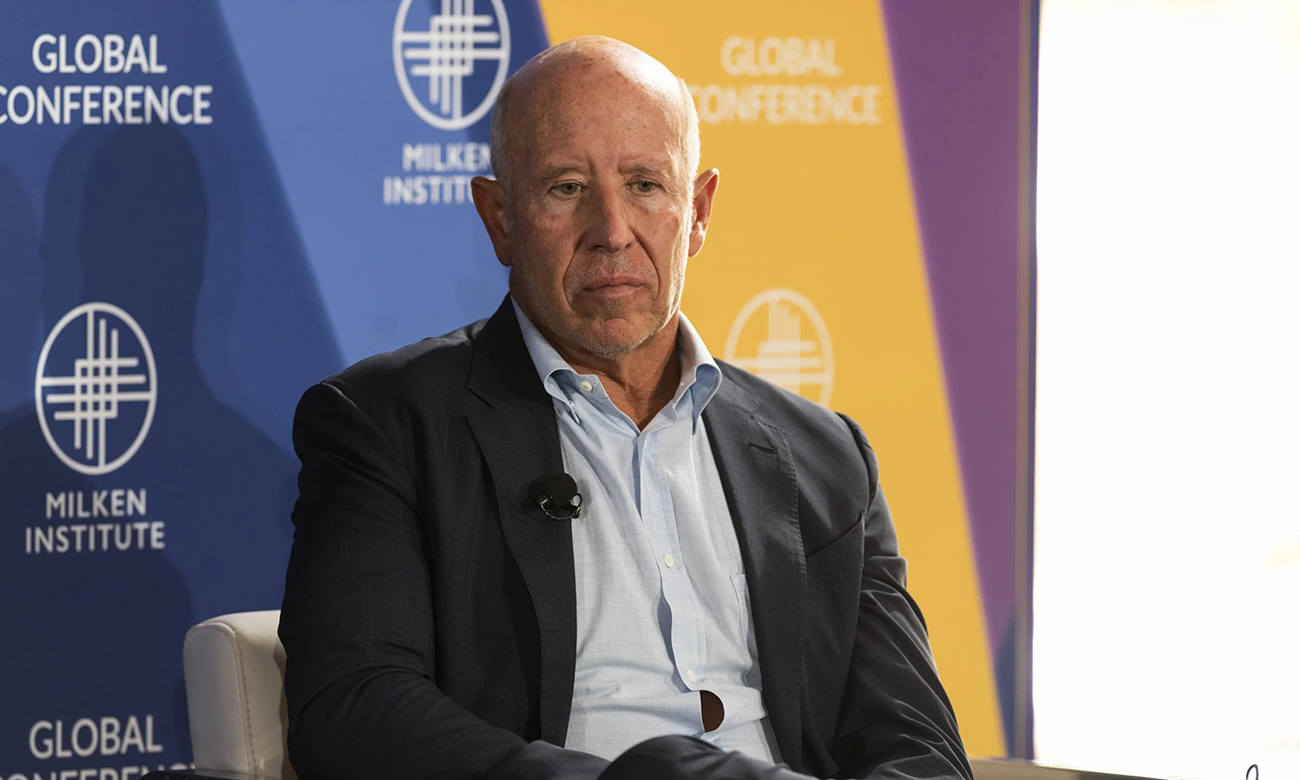
擁有46億美元凈資產的喜達屋資本(Starwood Capital)首席執(zhí)行官巴里·斯特恩利希特說,,通貨膨脹將下降,,而且會是大幅下降,。
在接受美國消費者新聞與商業(yè)頻道(CNBC)“財經論壇”(Squawk Box)節(jié)目采訪時,,斯特恩利希特被問及他將如何回應摩根大通首席執(zhí)行官杰米·戴蒙(Jamie Dimon)的年度致股東信。戴蒙在信中寫道,,目前的經濟狀況“引發(fā)了更多風險,,可能導致更高的通貨膨脹”,,以及更高的加息。他表示他是戴蒙的忠實粉絲,,并說他經營著“可能是世界上最好的銀行之一”,,但是之后斯特恩利希特向CNBC澄清說,“我們并不是在所有事情上都持相同觀點,?!?/p>
斯特恩利希特經營著一家以持有數(shù)十億房地產而聞名的私募股權公司,他告訴CNBC,,他認為“通貨膨脹將大幅下降”。
斯特恩利希特指出租金下跌是原因之一,,他提到了一張顯示了租金的同比增長的幻燈片,,其中有兩條線:一條線表示“實際租金”,另一條線表示按消費者價格指數(shù)(CPI)計算,。觀眾可以看到“實際租金”或租金掛牌價格在下降,,而按CPI衡量的另一條線看起來呈上升趨勢?!罢畧蟾孀饨饠?shù)據(jù)的方式存在滯后,,”斯特恩利希特說,但如果進行糾正,,它將在之后顯現(xiàn)出來,。
關于通貨膨脹或過時數(shù)據(jù),這已經不是他第一次發(fā)表意見了,。去年年底,,斯特恩利希特說“經濟正在自行放緩”,此前他稱美聯(lián)儲的加息是“自殘式自殺”,。當然,,在此之前,他就一直是美聯(lián)儲直言不諱的批評者,,他告訴《財富》,,美聯(lián)儲主席杰羅姆·鮑威爾(Jerome Powell)和“他那一幫瘋子”正在摧毀對資本主義的信仰,這最終將引發(fā)“社會動蕩”,。他還斥責該機構使用“舊數(shù)據(jù)”,,他認為舊數(shù)據(jù)是其積極加息的依據(jù)。盡管如此,,他曾聲稱“通貨膨脹正在迅速下降……而且下降的速度比人們預料的快得多”,,并再次敲響了警鐘。
斯特恩利希特本周表示,,住房占CPI的三分之一,,所以如果進行這個修正,,總的通貨膨脹率將下降,而這種情況可能會在夏末和秋初發(fā)生,。他繼續(xù)說,,“所以在其他條件不變的情況下,通貨膨脹率將下降,?!?/p>
在6月份,通貨膨脹率達到9.1%的峰值后,,截至2月,,以CPI衡量的通貨膨脹已放緩至6%。住房指數(shù)(衡量住房成本變化的指數(shù))是月度全部項目增長的最大貢獻者,,占增長的70%以上,。然而,根據(jù)租房網(wǎng)站(Rent.com)的數(shù)據(jù),,2月份的租金增長持續(xù)放緩,,這是全國范圍內連續(xù)第六個月的個位數(shù)的增長。該網(wǎng)站報告顯示,,月租金中位數(shù)環(huán)比上漲1.7%,,但同比下降0.25%。在州級市場上,,租金中值低于研究中60%的市場環(huán)比,,略高于16%的市場同比。
斯特恩利希特說,,他的租金數(shù)據(jù)來自美國租金數(shù)據(jù)庫,,并補充說他的公司擁有12.5萬套公寓,可以對其進行建模,,但它在全美范圍內并不統(tǒng)一,。他表示,當租金上漲20%時,,“這才是真正推動CPI上漲的原因,。”正如我們所知,,斯特恩利希特繼續(xù)嘲笑著美聯(lián)儲的信譽,,這對他來說已經稀疏平常了。
盡管斯特恩利希特沒有評論通貨膨脹下降對房地產市場,、商業(yè)或住宅的影響,,但很明顯,該行業(yè)內的這兩個部門對加息極為敏感,,當利率上升時,,房產價值可能會下降,。不過,即使斯特恩利希特強調通脹率在下降,,他還是認為“我們將進入一個嚴重的衰退期”,。(財富中文網(wǎng))
譯者:中慧言—項曦瑩
擁有46億美元凈資產的喜達屋資本(Starwood Capital)首席執(zhí)行官巴里·斯特恩利希特說,通貨膨脹將下降,,而且會是大幅下降,。
在接受美國消費者新聞與商業(yè)頻道(CNBC)“財經論壇”(Squawk Box)節(jié)目采訪時,斯特恩利希特被問及他將如何回應摩根大通首席執(zhí)行官杰米·戴蒙(Jamie Dimon)的年度致股東信,。戴蒙在信中寫道,,目前的經濟狀況“引發(fā)了更多風險,可能導致更高的通貨膨脹”,,以及更高的加息,。他表示他是戴蒙的忠實粉絲,并說他經營著“可能是世界上最好的銀行之一”,,但是之后斯特恩利希特向CNBC澄清說,“我們并不是在所有事情上都持相同觀點,?!?/p>
斯特恩利希特經營著一家以持有數(shù)十億房地產而聞名的私募股權公司,他告訴CNBC,,他認為“通貨膨脹將大幅下降”,。
斯特恩利希特指出租金下跌是原因之一,他提到了一張顯示了租金的同比增長的幻燈片,,其中有兩條線:一條線表示“實際租金”,,另一條線表示按消費者價格指數(shù)(CPI)計算。觀眾可以看到“實際租金”或租金掛牌價格在下降,,而按CPI衡量的另一條線看起來呈上升趨勢,。“政府報告租金數(shù)據(jù)的方式存在滯后,,”斯特恩利希特說,,但如果進行糾正,它將在之后顯現(xiàn)出來,。
關于通貨膨脹或過時數(shù)據(jù),,這已經不是他第一次發(fā)表意見了。去年年底,,斯特恩利希特說“經濟正在自行放緩”,,此前他稱美聯(lián)儲的加息是“自殘式自殺”。當然,,在此之前,,他就一直是美聯(lián)儲直言不諱的批評者,,他告訴《財富》,美聯(lián)儲主席杰羅姆·鮑威爾(Jerome Powell)和“他那一幫瘋子”正在摧毀對資本主義的信仰,,這最終將引發(fā)“社會動蕩”,。他還斥責該機構使用“舊數(shù)據(jù)”,他認為舊數(shù)據(jù)是其積極加息的依據(jù),。盡管如此,,他曾聲稱“通貨膨脹正在迅速下降……而且下降的速度比人們預料的快得多”,并再次敲響了警鐘,。
斯特恩利希特本周表示,,住房占CPI的三分之一,所以如果進行這個修正,,總的通貨膨脹率將下降,,而這種情況可能會在夏末和秋初發(fā)生。他繼續(xù)說,,“所以在其他條件不變的情況下,,通貨膨脹率將下降?!?/p>
在6月份,,通貨膨脹率達到9.1%的峰值后,截至2月,,以CPI衡量的通貨膨脹已放緩至6%,。住房指數(shù)(衡量住房成本變化的指數(shù))是月度全部項目增長的最大貢獻者,占增長的70%以上,。然而,,根據(jù)租房網(wǎng)站(Rent.com)的數(shù)據(jù),2月份的租金增長持續(xù)放緩,,這是全國范圍內連續(xù)第六個月的個位數(shù)的增長,。該網(wǎng)站報告顯示,月租金中位數(shù)環(huán)比上漲1.7%,,但同比下降0.25%,。在州級市場上,租金中值低于研究中60%的市場環(huán)比,,略高于16%的市場同比,。
斯特恩利希特說,他的租金數(shù)據(jù)來自美國租金數(shù)據(jù)庫,,并補充說他的公司擁有12.5萬套公寓,,可以對其進行建模,但它在全美范圍內并不統(tǒng)一。他表示,,當租金上漲20%時,,“這才是真正推動CPI上漲的原因?!闭缥覀兯?,斯特恩利希特繼續(xù)嘲笑著美聯(lián)儲的信譽,這對他來說已經稀疏平常了,。
盡管斯特恩利希特沒有評論通貨膨脹下降對房地產市場,、商業(yè)或住宅的影響,但很明顯,,該行業(yè)內的這兩個部門對加息極為敏感,,當利率上升時,房產價值可能會下降,。不過,,即使斯特恩利希特強調通脹率在下降,他還是認為“我們將進入一個嚴重的衰退期”,。(財富中文網(wǎng))
譯者:中慧言—項曦瑩
Starwood Capital CEO Barry Sternlicht, who has a net worth of $4.6 billion, says inflation is going to drop—and it’s going to drop hard.
In an interview with CNBC’s Squawk Box, Sternlicht was asked what he’d say in response to JPMorgan Chase CEO Jamie Dimon’s annual letter to shareholders, in which Dimon writes that current economic conditions “create more risk and potentially higher inflation,” and higher rate hikes. However, after saying he’s a big fan of Dimon and that he runs “probably one of the best banks in the world,” Sternlicht clarified to CNBC that “we don’t agree on everything.”
Sternlicht, who runs a private equity firm known for its billions in real estate holdings, told CNBC that he thinks “inflation is going to drop hard.”
Sternlicht pointed to falling rents as the reason, alluding to a slide that showed year-over-year rent growth, with two lines: one indicating “actual rents” and the other per the consumer price index. Viewers can see “actual rents,” or rent list prices, shifting downward, while the other as measured by the CPI looks to be trending upward. “There’s a lag in the way the government reports rental data,” Sternlicht said, but if you correct for this, it’ll show up later.
And it’s not the first time he’s said as much about inflation or old data. Toward the end of last year, Sternlicht said “the economy is slowing on its own,” after calling the Federal Reserve’s rate hikes “self-inflicted suicide.” Of course, even before that, he had been a vocal critic of the Fed, telling Fortune that Fed Chair Jerome Powell and “his merry band of lunatics” were destroying faith in capitalism and would eventually trigger “social unrest.” He also berated the institution’s use of “old data” that’s behind its aggressive rate hikes. Nonetheless, he’s previously claimed “inflation is coming down hard…and it is coming down a lot faster than I think people thought,” and once again is sounding the alarm.
Shelter is one-third of CPI, Sternlicht said this week, so if you make that correction it will bring headline inflation down and you’ll likely see that happen in the late summer and early fall. He continued, “So all else being equal, inflation is going down.”
After peaking in June at 9.1%, inflation as measured by the consumer price index has slowed to 6%, as of February. The index for shelter (which measures changes in shelter costs) was the largest contributor to the monthly all-items increase, accounting for over 70% of the increase. However, rent growth continued to slow in February, marking the sixth consecutive month of single-digit increases on a national level, according to Rent.com. The median monthly rent rose 1.7% month over month but fell 0.25% year over year, according to the site’s report. On the state level, median rents were down in 60% of markets included in the study month over month and slightly over 16% of markets year over year.
His rent data, Sternlicht said, comes from a national rent database, before adding that his company has 125,000 apartments and they can model it, but it’s not uniform across the country. When rents were up 20%, Sternlicht said, “that’s what really drove CPI.” Sternlicht went on to mock the Fed’s credibility, which as we know isn’t an unusual take for him.
Although Sternlicht did not comment on what falling inflation means for the real estate market, commercial or residential, it’s clear that both sectors within the industry are extremely sensitive to rate hikes, and when interest rates go up, property values can go down. But even though Sternlicht argues inflation is falling, he thinks “we’re going into a serious recession.”






